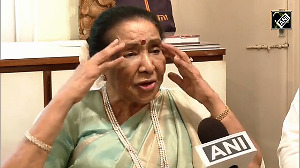India's journey to become an economic superpower is fraught with dangers but the country has the potential to overcome the turbulence, feels a management expert.
The widely held belief, particularly among constituents of India's 300 million strong middle class that the country was on its way to becoming an economic superpower in the near future, was misplaced, cautions Upendra Kachru, a management expert.
His book Extreme Turbulence was launched in the capital recently.
Kachru, however, expresses confidence in India's potential as an economic powerhouse. He highlighted the dangers we face as a nation on the move.
Unless the country gears up to face the onslaught of 'turbulence' resulting from a sudden yet tedious transition witnessed by the economy, it runs the risk of squandering the initial gains of growth, according to him.
"The focus of the book is on the challenges of change witnessed by India in its long journey of transition from a closed to an open economy and the resultant turmoils accompanied by this transition", says Kachru.
Though the Indian economy has crossed what Kachru calls the 'inflection point' of integration with the global economy, it has now entered the period of 'extreme turbulence', he says.
The 'extreme turbulence' results from a series of factors. Prominent among them were the quantum leaps achieved by scientific progress, technology advancement and social and political restructuring on the one hand.
On the other hand was the inability of the environment to sustain our burgeoning needs.
"One of the best aspects of our growth is that post 2005, we have passed a cusp, from where we can not go back, unless we make unprecedented blunders," Kachru says, adding, "The continuous growth sustained over almost a decade has already provided the required momentum to the economy."
However, the drawback, according to him stems from the fact that while a number of institutions existed to spell out models of perspective planning, no system had yet been deviced to take planning to the grassroots in order to ensure that growth does not bypass a section of them.
"You have to be able to take perspective planning from the ivory towers from where it is executed to the grassroots where it is implemented," Kachru says.
"I have tried to explain the processes of development to the middle class Indians through my book. I hope someone carries the explanation forward to grassroot levels", he says.
Responding to criticism that he overtly favoured capitalism as a model of economic development in his book despite its shortcomings, he calls the model of laissez fairre a 'necessary evil'.
"There are no accepted models of success that can be emulated today. Even the pride of being the most powerful nation could not keep a communist Soviet Union from disintegrating", he says.
"In the present circumstances we believe capitalism is the only way that can be manipulated to serve maximum people. It is what we call a necessary evil."





